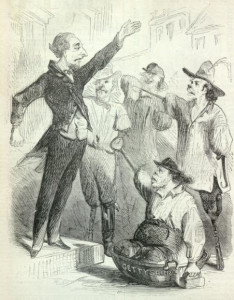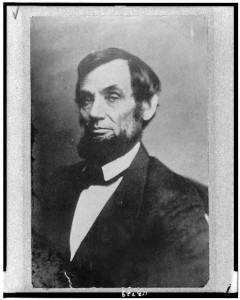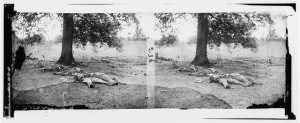Consequences of Vicksburg and Gettysburg
150 years ago yesterday President Lincoln called for a day of Thanksgiving; President Davis called for more troops – all white men between the ages of eighteen and forty-five not exempt. Of course, drafting in the North had already begun and been resisted.
From The Papers And Writings Of Abraham Lincoln, Volume Six:
PROCLAMATION FOR THANKSGIVING, JULY 15, 1863
BY THE PRESIDENT OF THE UNITED STATES OF AMERICA:
A Proclamation.
It has pleased Almighty God to hearken to the supplications and prayers of an afflicted people, and to vouchsafe to the army and navy of the United States victories on land and on the sea so signal and so effective as to furnish reasonable grounds for augmented confidence that the Union of these States will be maintained, their Constitution preserved, and their peace and prosperity permanently restored. But these victories have been accorded not without sacrifices of life, limb, health, and liberty, incurred by brave, loyal, and patriotic citizens. Domestic affliction in every part of the country follows in the train of these fearful bereavements. It is meet and right to recognize and confess the presence of the Almighty Father, and the power of His hand equally in these triumphs and in these sorrows.
Now, therefore, be it known that I do set apart Thursday, the 6th day of August next, to be observed as a day for national thanksgiving, praise, and prayer, and I invite the people of the United States to assemble on that occasion in their customary places of worship, and, in the forms approved by their own consciences, render the homage due to the Divine Majesty for the wonderful things He has done in the nation’s behalf, and invoke the influence of His Holy Spirit to subdue the anger which has produced and so long sustained a needless and cruel rebellion, to change the hearts of the insurgents, to guide the counsels of the Government with wisdom adequate to so great a national emergency, and to visit with tender care and consolation throughout the length and breadth of our land all those who, through the vicissitudes of marches, voyages, battles, and sieges have been, brought to suffer in mind, body, or estate, and finally to lead the whole nation through the paths of repentance and submission to the Divine Will back to the perfect enjoyment of union and fraternal peace.
In witness whereof, I have hereunto set my hand and caused the seal of the United States to be affixed.
Done at the city of Washington, this fifteenth day of July, in the year of our Lord one thousand eight hundred and sixty-three, and of the independence of the United States of America the eighty-eighth.
A. LINCOLN.
By, the President WILLIAM H. SEWARD,
Secretary of State.
From the Richmond Daily Dispatch July 16, 1863:
Proclamation by the President.
Proclamation by the President.
–Whereas it is provided by an act of Congress entitled “An act to further provide for the public Defence,” approved on the 16th day of April, 1862, and by another act of Congress, approved on the 27thSeptember, 1862, entitled “An act to amend an act entitled an act to provide further for the public defence, approved 14thApril, 1862,” that the President be authorized to call out and place in the military service of the Confederate States for three years, unless the war shall have been sooner ended, all white men who are residents of the Confederate States, between the ages of eighteen and forty five years, at the time the call may be made, and who are not at such time legally exempted from military service, or such part thereof as in his judgment may be necessary to the public defence:
And, whereas, in my judgment, the necessities of the public defence require that every man capable of bearing arms, between the ages aforesaid, should now be called out to do his duty in the defence of his country and in driving back the invaders now within the limits of the Confederacy:
Now, therefore, I, Jefferson Davis, President of the Confederate States of America, do, by virtue of the powers vested in me as aforesaid, call out and place in the military service of the Confederate States all white men, residents of said States, between the ages of eighteen and forty-five years, not legally exempted from military service; and I do hereby order and direct that all persons subject to this call, and not now in the military service, do, upon being enrolled, forthwith repair to the conscript camps established in the respective States of which they may be residents, under pain of being hold and punished as deserters in the event of their failure to obey this call, as provided in said laws.
And I do further order and direct, that the enrolling officers of the several States proceed at once to enroll all persons embraced within the terms of this proclamation, and not heretofore enrolled.
And I do further order, that it shall be lawful for any person embraced within this call to volunteer for service before enrollment, and that persons so volunteering be allowed to select the arm of service and the company which they desire to join, provided such company be deficient in the full number of men allowed by law for its organization.
Given under my hand, and the Seal of the Confederate States of America, at the city, of Richmond, this fifteenth day of July, in the year of our Lord one thousand eight hundred and sixty three.
(Signed,) Jefferson Davis.
By the President:
(Signed,) J P Benjamin, Secretary of State.
The Richmond Daily Dispatch finds men between the ages of forty and forty-five to be the best possible material for soldiers. From the Richmond Daily Dispatch July 16, 1863:
The President’s proclamation.
We invite the particular attention of all whom it may, or may not, concern, to the proclamation of President Davis, to be found in another column. We are glad to see the promptness with which the call of Lincoln for 300,000 fresh troops has been met. That functionary, like all his subjects, believes that everything can be done by force of numbers, and that to be efficient an army need only be big. Nothing can cure him of this delusion. During this war he has called into service, successively, 75,000, 300,000, 500,000, and 1,000,000 men, and yet he is no nearer the end of his enterprise now than he was in the beginning. He has been met at every turn by the undaunted spirit of a free people, and they have shown to the world, though they have not succeeded in convincing him, that such a spirit a proof against all odds, and superior to any force. He is about to try the same experiment once more, and we doubt not with the like measure of success.

JEFF DAVIS’S LAST APPEAL TO ARMS.
“Fellow Citizens—the Victory is within your reach. You need but STRETCH FORTH YOUR HANDS TO GRASP IT.”—(Address of Jeff Davis to his Soldiers.)
This proclamation will enormously swell the rank and file of our army, and swell it with the best possible material. From forty to forty five man is in the prime of his existence. He still retains all his strength and the greater part of his activity. He is cooler, calmer, and better, understands what he is fighting for than the young recruit. He understands the rights for which he is contending, and prefers death to defeat. We wish the Constitution had extended the time to sixteen and fifty.
We appeal to all Southern men to come forward at once, without waiting for the enrolling officer, and enroll their names. To stand back now is to cover themselves with shame, which the lapse of time can never erase. Besides, it will answer no good purpose, for the enrolling officers will not over look a man. All must be brought out, for the country wants their services. A great boon is offered in the alternative of selecting the company to serve with, or be conscripted. Few men of spirit will hesitate even for a moment.
To arms! to arms! fellow-citizens — form yourselves into battalions, into regiments, into brigades! The enemy is in your country, burning and ravaging at his will. Let us teach him a lesson he will never forget.
The political cartoon of Jefferson and the amputees from Vicksburg and Gettysburg was published in the August 22, 1863 issue of Harper’s Weekly hosted at Son of the South


